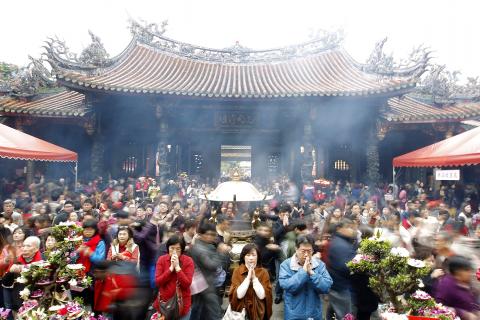One of the nation’s most important traditions creates mayhem in temples nationwide at midnight on Lunar New Year’s eve, as people flock to temples in the hope of being the first to put the first stick of incense of the year into the temple’s giant incense burner in the hope of ensuring good luck for the whole year.
Every year temples large and small are shrouded in a dense fog of incense smoke and packed with people praying for luck.
Thousands of people packed the outdoor square of Taipei’s Xingtian Temple (行天宮) before the clock struck midnight, waiting to race to the incense burner or simply to witness the spectacle.

Photo: Pichi Chuang, Reuters
“It’s horrible,” one person cried, stuck tightly into the crowd moving slowly toward the burner, each person holding several burning sticks of incense in their hands.
Others complained of a lack of order as people swarmed to reach the burner.
However, the race is not necessary, Taiwanese folklore expert Liu Huan-yueh said, because the first incense stick of the year is a personal thing and does not require being the first among thousands.
Many myths and legends surround the origin of Lunar New Year activities, including the most popular one — the tale of the monster “Nian” (年), which is a homophone for the word “year” in Chinese.
The Taiwan Folklore and Culture Research Workshop run by Providence University’s Chinese literature department says “Nian,” who is reputed to live in a deep mountain forest, is the reason that people in ancient China began to celebrate Lunar New Year.
The stories say the fierce beast would come out of hiding every spring to attack people, especially children, around the Lunar New Year. To scare it off, people would set off firecrackers to make noise, light fires and wear red.
In Taiwan, the origin of the celebrations emerged from the mythology of a “Sinking Land,” the Taichung-based workshop said.
According to Taiwanese folk legend, a lower-ranked god named “Lamp Monkey” (燈猴), which protects the light in household oil lamps, is said to have complained to the Jade Emperor (玉皇大帝) about the behavior of mortals.
Lamp Monkey, angry because mortals did not know he existed, accused humans of being ungrateful and unwilling to work hard. The emperor decided to sink Taiwan into the sea on the eve of Lunar New Year as a punishment.
Informed of the bad news, the island’s residents put on their best clothes and prepared the most luxurious foods they could find to share with family members and friends on what they believed was to be the last night of their life.
The feast developed into traditional family reunion dinner on Lunar New Year’s eve. The Taiwanese practice of staying up throughout the night with the family originates from the idea of people staying up waiting for the island to sink.
Legend says the Jade Emperor eventually canceled the punishment after finding out that Lamp Monkey had lied about humans’ lack of respect for the gods. To celebrate, the humans set off firecrackers, congratulated each other on their “rebirth” and visited temples to thank the gods for their blessings.

An essay competition jointly organized by a local writing society and a publisher affiliated with the Chinese Communist Party (CCP) might have contravened the Act Governing Relations Between the People of the Taiwan Area and the Mainland Area (臺灣地區與大陸地區人民關係條例), the Mainland Affairs Council (MAC) said on Thursday. “In this case, the partner organization is clearly an agency under the CCP’s Fujian Provincial Committee,” MAC Deputy Minister and spokesperson Liang Wen-chieh (梁文傑) said at a news briefing in Taipei. “It also involves bringing Taiwanese students to China with all-expenses-paid arrangements to attend award ceremonies and camps,” Liang said. Those two “characteristics” are typically sufficient

A magnitude 5.9 earthquake that struck about 33km off the coast of Hualien City was the "main shock" in a series of quakes in the area, with aftershocks expected over the next three days, the Central Weather Administration (CWA) said yesterday. Prior to the magnitude 5.9 quake shaking most of Taiwan at 6:53pm yesterday, six other earthquakes stronger than a magnitude of 4, starting with a magnitude 5.5 quake at 6:09pm, occurred in the area. CWA Seismological Center Director Wu Chien-fu (吳健富) confirmed that the quakes were all part of the same series and that the magnitude 5.5 temblor was

The brilliant blue waters, thick foliage and bucolic atmosphere on this seemingly idyllic archipelago deep in the Pacific Ocean belie the key role it now plays in a titanic geopolitical struggle. Palau is again on the front line as China, and the US and its allies prepare their forces in an intensifying contest for control over the Asia-Pacific region. The democratic nation of just 17,000 people hosts US-controlled airstrips and soon-to-be-completed radar installations that the US military describes as “critical” to monitoring vast swathes of water and airspace. It is also a key piece of the second island chain, a string of

The Central Weather Administration has issued a heat alert for southeastern Taiwan, warning of temperatures as high as 36°C today, while alerting some coastal areas of strong winds later in the day. Kaohsiung’s Neimen District (內門) and Pingtung County’s Neipu Township (內埔) are under an orange heat alert, which warns of temperatures as high as 36°C for three consecutive days, the CWA said, citing southwest winds. The heat would also extend to Tainan’s Nansi (楠西) and Yujing (玉井) districts, as well as Pingtung’s Gaoshu (高樹), Yanpu (鹽埔) and Majia (瑪家) townships, it said, forecasting highs of up to 36°C in those areas